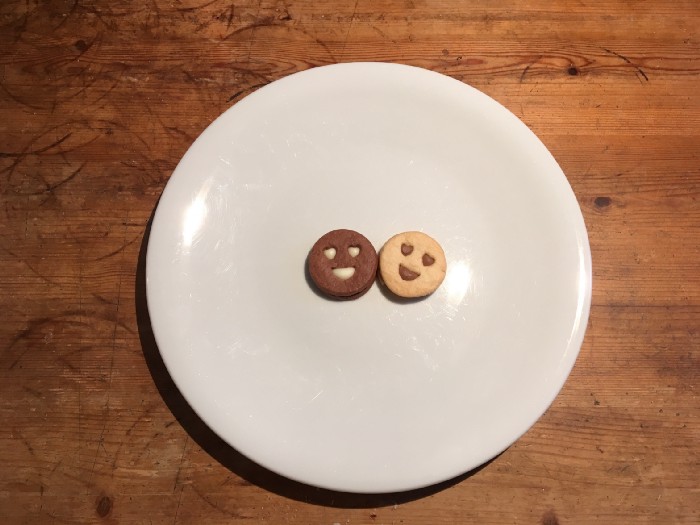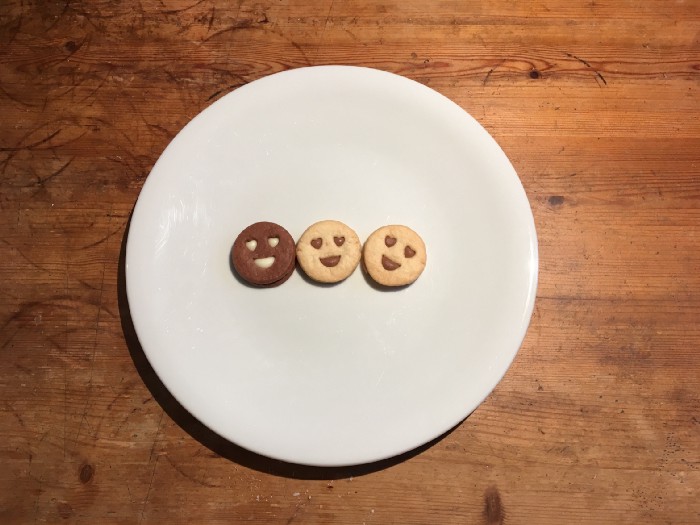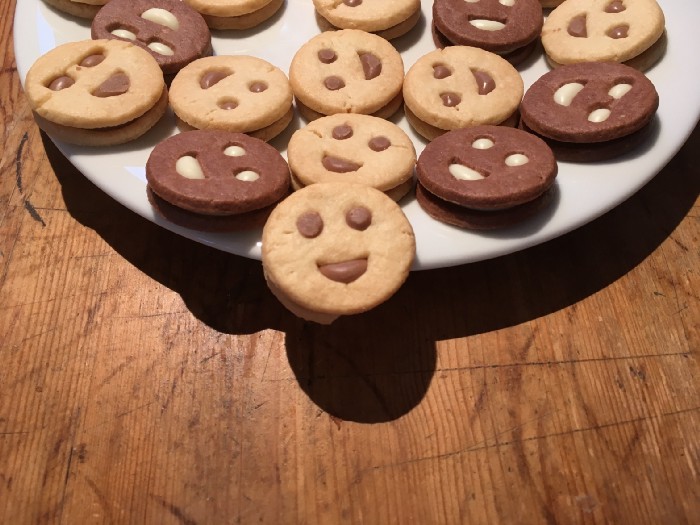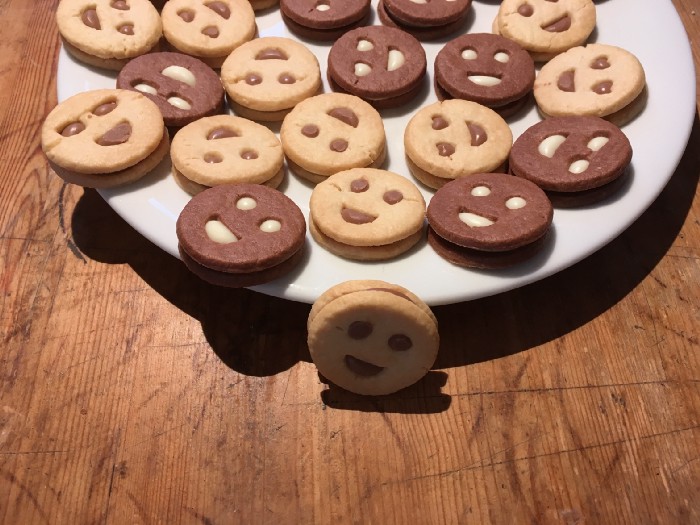For this little game project (great for a family afternoon on a rainy Sunday) you need the following:
- A flat, large plate
- Quite a lot of cookies (2 different kinds, rather small, round if possible, not too thin)
- A bunch of hungry kids or friends (Not too few. You will see later why)
Now we start. Be warned: I will — to support understanding what happens — introduce a few definitions and use them strictly. It is therefore important that you memorize them.
Put the plate on the table. From now on, we will call this plate „earth“. In the beginning, the plate, „earth“, is empty. This is quite boring, so let’s put a first cookie on the plate.
We call this first cookie „eve“. Now put a cookie of the second kind on „earth“, next to „eve“ (we call the two types of cookies „sexes“). We will call this second cookie „adam“:

We now introduce a simple rule:
Rule 1: Whenever two cookies of different „sex“ are lying next to each other for more than three minutes, we proceed as follows:
- We make some space between the two cookies by moving them away
- We put a new cookie (any kind) between the two cookies

We call step 2 „birth“, the cookies which get separated are the „parents“ and all the new cookies just „humans“. Let’s introduce a second rule:
Rule 2: Whenever a „human“ is more than 10 minutes on „earth“, we take it away from „earth“ and eat it.
We call this process „natural death“.
Now follow the two rules for a while. It’s not so easy. If you don‘t have enough cookies (or if you believe in reincarnation) you can keep the cookies after „natural death“ for later insertion/”birth”, instead of eating them.
In the first half an hour or so (depending on the size of your „earth“ and your „humans“) nothing special will happen. We call this phase „paradise“. Notice that the „humans“ need more and more space on „earth“. Of course the simple reason is, that each new „human“ consumes a certain amount of space on „earth“ (the size of the cookie): We will call the size of this space „ecological footprint“.
Sooner or later you will notice a problem: A first „human“ does not fit completely on the plate („earth“) anymore: It is partly hanging over the edge of „earth“.
Or in other words: it has less space on „earth“ than what its normal „ecological footprint“ is:

We call this „human“ a „suffering“ „human“.
If we now proceed following the two rules, it will happen sooner or later, that a first cookie falls off the plate. We eat these cookies too (make sure you play this game with enough kids/friends present, otherwise everybody will have an upset stomach soon). We call the process when a cookie is pushed over the edge of „earth“ by one or more other cookies „killing/famishment“:

Now you have to be very attentive, because soon all the important things will happen. You will notice that „birth“ and „killing/famishment“ very often happen together: Often when you are in step 1 Of Rule 1 (separating the „parents“) a „human“ on the edge will experience „killing/famishment“. This can happen even when you insert a new „human“ in the middle of „earth“, far away from the edge. The reason is, that the „humans“ are pushing each other in something like a chain reaction, which starts at the separated „parents“ and ends somewhere at the edge, where the „humans“ experience „suffering“ or even „killing/famishment“ (i.e. fall off the plate).
We also notice that „humans“ in the middle of „earth“ are much less likely to get pushed over the edge. Because of this, we call this region „rich region“ and the regions close to the edge „poor regions“. When a „human“ experiences „killing/famishment“ it is usually quite clear, which 1–2 other „humans“ finally pushed it over the edge. We call these clearly identifiable „humans“ „evil“.
So far, so simple. Now things are getting a bit more complicated (but don’t worry, we will find a way to make them simple again). Because we play the game very slowly and with a very small „earth“, we usually know which „birth“ was ultimately responsible for the observed „killing/famishment“ (because the two events happen often at the same time). But if we would play the game with a very large plate, where every second many thousand cookies get inserted, this would be impossible to observe. All we could see, is a continuous slow movement of all the „humans“. It would be impossible to link a „birth“ to a particular „killing/famishment“ because every second so many of these events happen.
Another problem is, that we do not observe a „killing/famishment“ event after every „birth“: Sometimes a „birth“ just pushes — possibly over many intermediate „humans“ — several other „humans“ further into „suffering“. Then only in the next „birth“ some „humans“ fall off „earth“.
And sometimes there is even enough space for the „birth“, because of a previous „natural death“. Because of these fundamental difficulties to identify the true reason for a „killing/famishment“, we simply call all the „humans“ which are never directly (!) pushing another „human“ over the edge of „earth“, „good“ „humans“. Of course all „humans“ are doing this indirectly, this we can observe all the time. But we ignore this for practical reasons (otherwise we would have to call all „humans“ „evil“, which would make the definition useless). We also like this definition, because now each „human“ is clearly either „good“ or „evil“.
It is clear now that the „poor regions“ contain much more „evil“ „humans“ and the „rich region“ in the center much more „good“ „humans“. We call the former effect „war“ and the latter „peace“.
Note that the „humans“ cannot interfere in any way with all this (hey, they are just cookies!). It is you, who inserted the new „humans“ on „earth“ and it is your kids/friends who ate them!
This is why we call the „humans“ „innocent“.
All images © author
Follow me on X to get informed about new content on this blog.
